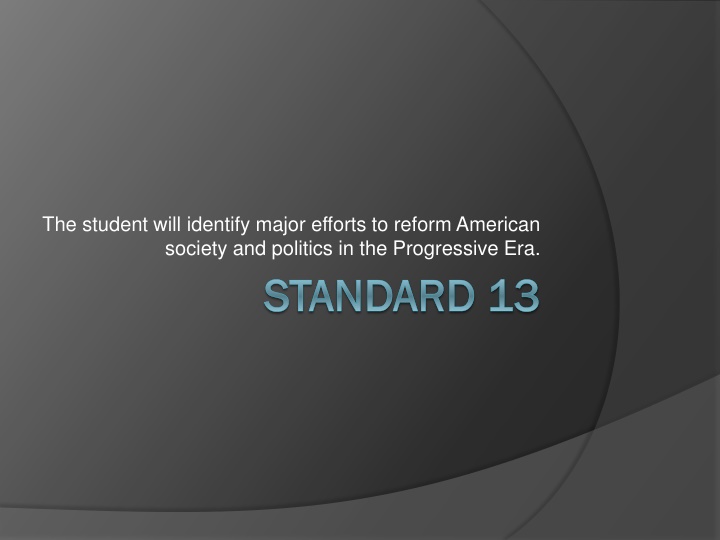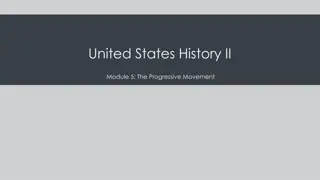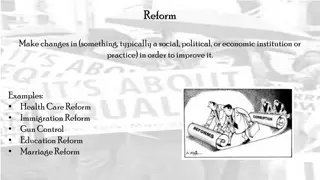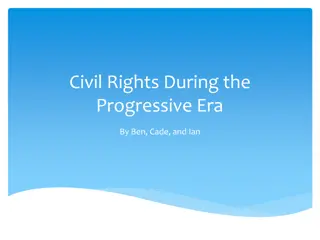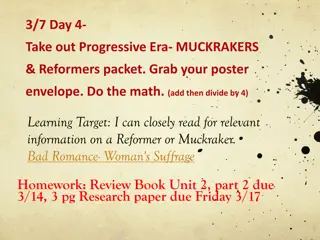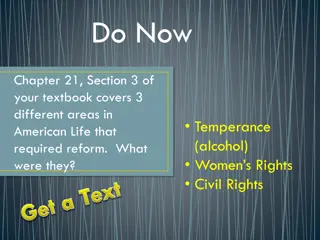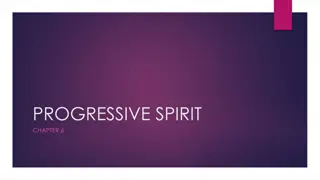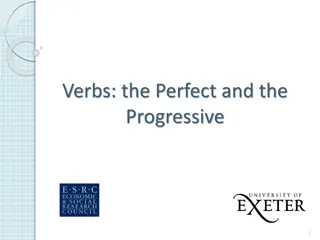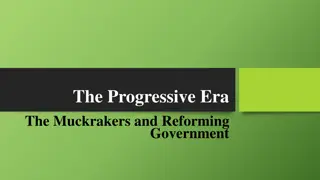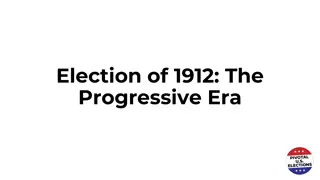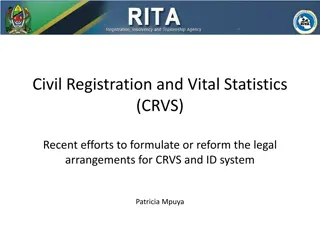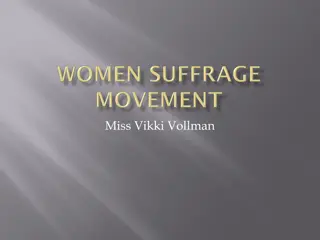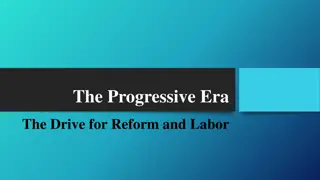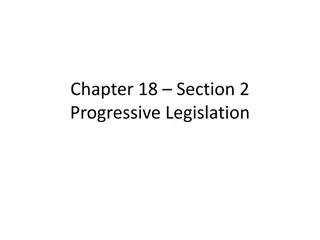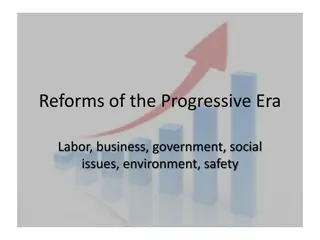Efforts to Reform American Society in the Progressive Era
Major reform efforts in the Progressive Era included Upton Sinclair's expose of the meatpacking industry in "The Jungle," resulting in federal oversight. Women played a significant role in reform movements, with Jane Addams establishing Hull House to aid immigrants. The era also saw the rise of Jim Crow laws, the Plessy v. Ferguson case, and the founding of the NAACP to combat racial discrimination.
Download Presentation

Please find below an Image/Link to download the presentation.
The content on the website is provided AS IS for your information and personal use only. It may not be sold, licensed, or shared on other websites without obtaining consent from the author.If you encounter any issues during the download, it is possible that the publisher has removed the file from their server.
You are allowed to download the files provided on this website for personal or commercial use, subject to the condition that they are used lawfully. All files are the property of their respective owners.
The content on the website is provided AS IS for your information and personal use only. It may not be sold, licensed, or shared on other websites without obtaining consent from the author.
E N D
Presentation Transcript
The student will identify major efforts to reform American society and politics in the Progressive Era. STANDARD 13 STANDARD 13
a. Explain Upton Sinclairs The Jungle and federal oversight of the meatpacking industry.
The Jungle In his novel The Jungle, Sinclair told the story of European immigrants working in Chicago s meatpacking industry The book exposed the poor labor practices and unsanitary conditions that produced contaminated food Congress was pressured to pass laws to regulate the meatpacking industry and to require meat packers to produce food that was safe to consume
b. Identify Jane Addams and Hull House and describe the role of women in reform movements.
Women Reform Women Progressives, in particular, sponsored laws to end child labor and to require government inspections of workplaces Jane Addams brought a British idea, the settlement house, to the United States She established the Hull House in Chicago
Women Reform Hull House was a social service agency that provided trained workers to help: Recent immigrants Working-class citizens To learn about: Home economics Basic medical care The English language Legal rights Other topics important to low-income urban residents
c. Describe the rise of Jim Crow, Plessy v. Ferguson, and the emergence of the NAACP.
African American Rights Race relations in the South worsened African Americans were denied basic rights They suffered worse racial discrimination and segregation than what they had encountered in the years after the Civil War
Jim Crow Southern and border states passed segregation laws that required separate public and private facilities for African Americans These were called Jim Crow laws (after a character in an old minstrel song) and resulted in inferior: Education Health care Transportation systems For African Americans
Plessy v. Ferguson In 1896, the U.S. Supreme Court upheld the constitutionality of Jim Crow laws in Plessy v. Ferguson Under the separate but equal doctrine, the Court ruled racial segregation was legal in public accommodations such as railroad cars African Americans disagreed about how to best oppose Jim Crow laws
NAACP One group, which sought full social and economic equality for African Americans, eventually formed the: National Association for the Advancement of Colored People To seek full civil rights for African Americans Better known today as the NAACP This group still keeps its original name in honor of the people who founded it to help overturn Plessy v. Ferguson
d. Explain Ida Tarbells role as a muckraker.
Muckrakers Many reforms came about after journalists investigated and exposed: Political corruption Child labor Slum conditions Other social issues
Muckrakers These journalists were called muckrakers Famous among them were: Upton Sinclair Ida Tarbell
Muckrakers In a series of magazine articles, Tarbell exposed political corruption in New York Chicago Other cities Criticized Standard Oil Company s unfair business practices Her findings angered the public and contributed to the government s decision to break up the Standard Oil Trust
e. Describe the significance of progressive reforms such as the initiative, recall, and referendum; direct election of senators; reform of labor laws; and efforts to improve living conditions for the poor in cities.
Progressive Reforms The Progressives supported new ideas and policies they believed would improve people s lives They supported increased government regulation of: Business and industry Efforts to protect consumers and workers Policies to conserve natural resources
Progressive Reforms Their efforts to improve living conditions for the poor in cities led to more and better: Libraries Schools Hospitals Parks The Progressives also opposed political bosses and had scorn for citizens lack of control over them
Progressive Reforms Progressive election reforms helped to increase ordinary citizens direct control of government in these ways:
Progressive Reforms Supporters of any new law may collect voters signatures on an initiative To force a public vote on the issue This prevents government officials from ignoring the desires of citizens
Progressive Reforms When enough citizens support an initiative The government must present the issue to the public as a referendum On which the public may vote This also prevents government officials from ignoring the desires of citizens
Progressive Reforms Citizens may remove public officials from office before their terms expire by organizing a recall election This allows citizens to control who serves in government
Progressive Reforms Another Progressive reform was the direct election of senators Under the U.S. Constitution, each state s legislature elected that state s U.S. senators
Progressive Reforms The Progressives favored the adoption of an amendment to the Constitution that gave voters the right to elect their U.S. senators They succeeded in their efforts with the adoption of the Seventeenth Amendment in 1913
